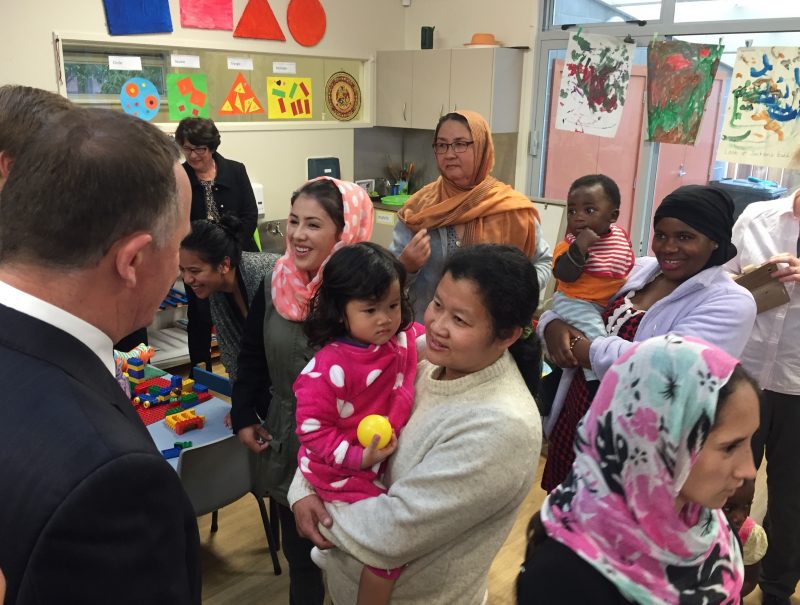A Catholic social action agency has expressed fears that poverty is becoming more entrenched, even as Prime Minister John Key admitted the government may not be spending enough to alleviate the plight of the most vulnerable in New Zealand.
Speaking at a breakfast forum to raise funds for De Paul House on June 30, Mr Key gave assurances that the government is doing a lot to address these issues, particularly homelessness, which he pointed out is “complicated but not unique to New Zealand”.
The forum was held at the Spencer on Byron Hotel in Auckland.
“Housing is a significant issue in a place like Auckland, like it is in major cities around the world,” he said. “[The solution] is not as simple as saying we click our fingers, or people are not trying hard enough, or it’s just an issue of money.”
Mr Key said that last year the government spent about $10.4 billion on the most vulnerable people in society.
“We do spend a lot. The question, of course, is always, is it enough? And I think the answer is no,” he said.
De Paul House manager Jan Rutledge expressed her gratitude to the Prime Minister, who took time after the forum to visit with families who had been through or are staying at the house.
De Paul House is a Catholic agency that provides emergency housing and family support services to people north of Auckland. It is in North Shore where average prices for a three bedroom house are hitting $1 million and average rent is $500 a week.
“I think it’s entrenched, that’s what we are seeing, increasingly entrenched poverty,” said Ms Rutledge.
She said 2015 was their busiest year ever. Last year, they had one to two walk-ins a day. For the first six months of the year, though, walk-ins were averaging two to three a day.
“I think the last time I looked at our stats, there was a 27 per cent increase in general enquiries, [people] saying they need assistance,” she said.
Last year, De Paul house helped 43 families with temporary accommodation. That number had already reached 27 for the first six months of this year. The organisation has 12 units and families can stay for 16 weeks or until a suitable home can be found.
“We are full. We sort of always work at 100 per cent occupancy, because the need is overwhelming,” she said.
The families live independently, with each with their own kitchen and bathroom. “For some of them, it’s their first opportunity they’ve had to regroup as a family because they have lived a transient, chaotic lifestyle, just trying to look for a place where they might live,” Ms Rutledge said.
She expressed concern not only about homelessness but the increasing challenge of putting food on the table and maintaining health.
“We’re seeing referrals from hospital social workers. We’ve got three young families here and they came to us from hospital referrals. They have newborn babies and nowhere to go,” she said.
“That’s an increasing trend and a very concerning one for us.”
Mr Key said the problem is very complicated and that the government is studying data provided by the 40-year Dunedin Multidisciplinary Health and Development study to find solutions. The Dunedin study has tracked the lives of more than 1000 people born in 1972 and the results are helping policymakers.
“In the modern world where we understand data better, we [may be able to identify] where the highest risk is. If we can do that, it will cost the Crown a lot more money up front but it will save a lot of money in the long term and will have far better outcomes for New Zealand,” Mr Key said.
Rent assistance
At the moment, the government is providing income-related rent assistance where people with low incomes pays only the equivalent of a quarter of their earnings to pay the rent. The Crown covers the rest, he said.
The government is also encouraging more community housing providers, promising to fund income-related rents for providers as well.
At the De Paul House meeting, the Prime Minister spoke to a pregnant young woman whose baby may become a third generation family member born into homelessness. The young woman and her partner grew up in makeshift dwellings in west Auckland.
He also met women who came to New Zealand as refugees from Afghanistan.
He advised the women to seek the help of their MPs to bring over loved ones who are still in the wartorn country.
Mr Key praised the good work done by the staff and volunteers of De Paul House, acknowledging that sometimes the most vulnerable people feel more comfortable dealing with non-governmental organisations.
“It’s always very complicated. Sometimes, the people don’t know what the Crown can give them. They are not just aware of what they can get and they are very reluctant to reach out to us.
“Often they [non-governmental organisations] have far better contact and engagement than we can give,” he said.
He said it was hoped the government would be able to provide more permanent help to people who are making the transition from emergency situations.
Mr Key also donated $750 to De Paul House, matching and raising a challenge made by investment banker John Duncan to donate $500.

Reader Interactions